Women's Weekly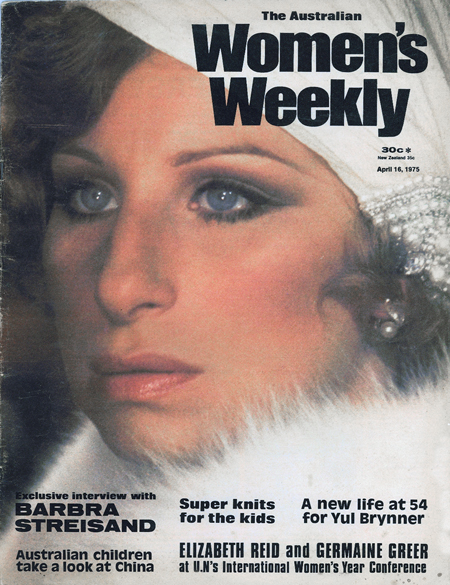
(Australia magazine)
April 16, 1975
Superstar Barbra says this is her last film musical. “From now on I'm going to do ladies like Sarah Bernhardt did. I'd like to play opposite Brando. I don't want to do just what I'm expected. It's no fun.”
By Robert Feldman in New York
“When you're a star, everything you do is magic.” Barbra Streisand tells Omar Sharif on screen in the new film, Funny Lady.
It's a punch line spoken from the dressing room floor where Barbra, as Fanny Brice, stumbles after hearing Omar, as the gambler Nicky Arnstein, tell her he's married a rich dame with more class. The cad departs. Music up. Barbra breaks into the keening “Am I Blue?” number.
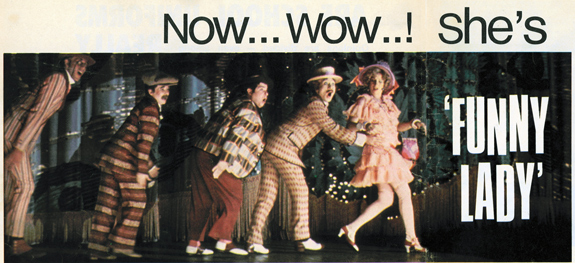
It's a show-stopper — as are all 16 songs in Funny Lady, the smash sequel to Funny Girl, which won Streisand an Academy Award as Best Actress in 1968.
Apparently there has been no pratfall at the box office, where Streisand's image has got filmgoers queueing up again.
Funny Girl, the semi-biography of the late Broadway comedienne Fanny Brice, collected a record gross for the studio — in Australia, for example, it earned one-fifth of all cinema receipts for that year. The sequel, bright, brash, funny, spectacular and tuneful — best of all, endowed with a more endearing Streisand and her new, surprisingly well-matched co-star, James Caan may do even better.
Savor it, because this will be the last time La Streisand will warble her well-tuned song.
The one-time waif from the Brooklyn ghetto who bobbed her name, but not her nose, has at 32 made her last musical, feeling now the ineluctable call to Grow As An Actress.
“You've seen me in my last musical,” a determined Barbra announced the other day across a luncheon table at New York's Hotel Pierre. “I'm not doing films like Funny Lady any more, playing self-deprecating parts. From now on, I'm going to do ladies like Sarah Bernhardt did.
“I'd like to do Camille, for example. I'd like to play opposite Brando. I don't want to be known as a musical comedy actress.”
Perhaps to prepare for her ascendancy, Streisand took the step to heal the long-standing breach with the critical New York printed Press (TV and the other media have always doted on Barbra). The wooing was done over a luncheon of curried prawns, Chicken a la King and empty film canisters, after an aperitif of crushed photographers.
“Would you look over here for the Associated Press?” a photographer called out from the scrum. James Caan, who had joined Streisand for the ritual, prompted, “Look over there for the Associated Press!”
“Say cheese for The Australian Women's Weekly,” I ventured.
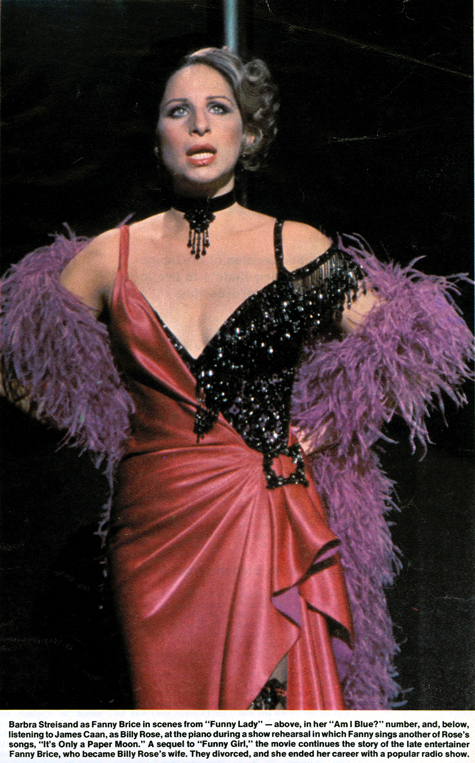 “Vy not?” Barbra replied in her best Miss Marmelstein manner. “Cheese!”
“Vy not?” Barbra replied in her best Miss Marmelstein manner. “Cheese!”
But with the writing Press, Streisand was deadly serious and accusing. “Why doesn't anyone ever say anything good about the way I look, except in the fashion magazines?
“There's this Press image of me as the homely Cinderella. To me it's boring and based on the past. The truth is I'm much more interesting.
“Yes, I agree I contributed to the legend by playing those self-deprecating woman roles. That was even the case with The Way We Were—my favorite role, but the image was of a girl who became a political activist because she was homely.
“When I did Owl and the Pussycat,” Streisand continued, “they said I couldn't get away with a film without singing in it. I told them I wouldn't sing if they pried my mouth open with a crowbar.
“I don't want to do just what I'm expected to do. It's no fun. I hated doing Hello, Dolly! I did it against my will, because I was going to be sued by Twentieth-Century Fox and I said hell I'll do the picture just to spite them. I told them I wasn't right for the part and to give it to Carol Channing or somebody. I liked the costumes anyway.
“So I am getting more involved in making my own films. I've been asked to play Emma Goldman (the turn-of-the-century American anarchist) and even Golda Meir. But my next movie will be a women's liberation version of A Star Is Born. The man dies and the woman rises from the ashes.
“I've been getting into mysticism and digging into ancient history. Did you know that until Cleopatra civilisations were really run by women? Then when the males took over, the world went to pot for a long while.
“Now we're witnessing the rebirth of woman power.”
Miss Streisand is in the unique position of being more than a multi-media star (film, stage, TV and recordings) In Hollywood she is a Queen, and as Queen, she wields absolute power over her roles, commanding the producer, director, her costar — anybody on the studio lot.
Barbra's life has changed radically since as a teenager she crossed the East River from Brooklyn to try her luck on Broadway. At first a cabaret singer, she became an overnight success in 1962 as the comedienne secretary, Miss Marmelstein, in I Can Get It For You Wholesale.
She was immediately cast by Ray Stark to play his late mother-in-law, Fanny Brice, in his stage production of Funny Girl. That show opened 11 years ago, and Barbra's triumph was later repeated in London.
Streisand made a dazzling series of color TV specials, recorded gold after gold (and platinum) albums, did concerts, was elected to the International Best-dressed list.
Gradually Hollywood took precedence, particularly after she encountered difficulties in finding a suitable New York apartment—she was twice rejected by snobby co-operatives. (“You'd think they'd support their local talent,” Barbra complained at the Pierre Press luncheon. “I always got my worst reviews in this town.”)
Her 1963 marriage to Elliot Gould broke up and she moved to Beverly Hills with son Jason, now eight. (Her current romantic attachment is to Jon Peters, a hairdresser— of late, also a film producer.)
From Funny Girl, Streisand moved immediately to two other films based on Broadway musicals, Hello, Dolly! and On a Clear Day You Can See Forever. Then she made five non-singing films in a row, Owl and the Pussycat, What's Up, Doc?, Up the Sandbox, The Way We Were and For Pete's Sake.
Funny Lady takes up the Fanny Brice story from 1930, after her divorce from Nicky Arnstein. Enter Billy Rose.
In reality, Rose, known on Broadway as “the bantam Barnum,” was a nasty, cold, mean creature who was, however, a genius. A teenage shorthand champion (200 words a minute) he became secretary to Bernard Baruchi, the financier, and became a Wall Street Wizard in his own right.
When he turned his attention to show business he cashed in as impresario and restaurateur. In his spare time, he dashed off hit songs by the dozen.
Indeed, it is Rose's music that makes Funny Lady swing. Included are such standards as “More Than You'll Know,” “It Was Only a Paper Moon,” “I Found a Million Dollar Baby,” Am I Blue?”“It's Gonna Be a Great Day,” and “Me and My Shadow.” The other songs in the film are contemporary imitations of Rose's style.
The marriage to Fanny Brice was short-lived. Fanny being swiftly succeeded by Olympic swimmer Eleanor Holm, the curvaceous star of Rose's celebrated Aquacade at the New York World's Fair in 1939. Fanny Brice retired to Hollywood to do "Baby Snooks" on the radio.
In the Hollywood reversion, of course, romantic liberties are ingratiatingly taken—after all, this is not a documentary, and who outside New York ever heard of Rose or Brice?
Short, fat, bald, mean, detestable Billy Rose is transformed into muscular, lovable James Caan.
Caan's study of the late producer did yield some physical mannerisms. “I found out that Billy was a little coarse and somewhat sloppy,” Caan told me. “I pictured Billy Rose as a sort of Shmateh (rag) salesman on 37th Street, you know, the kind of guy who bends over to talk to you, grabbing your sleeve.
“I got the Yiddishisms from hanging round Barbra and, secondly, my parents are Jewish and, thirdly, I was brought up right here in Sunnyside, Queens, New York.”
Caan has proved so unexpectedly good in the role that local critics are hailing him as Streisand's full equal on the screen.
“I picked Jimmy for the film because I had to have somebody who talks as fast as me,” said Barbra.
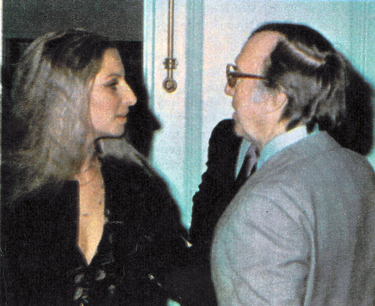
(Above: At a press conference in New York — “where I got the worst reviews”—Barbra talks to “Funny Lady” producer Ray Stark. [Fanny Brice was his mother in law.])
End.
More Photos of Caan & Streisand at Hotel Pierre Press Conference, 1975:
Read another article about this press conference here.
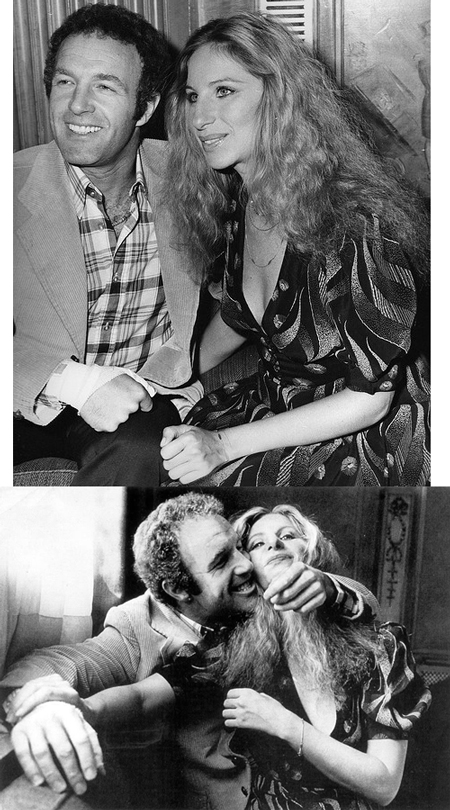
[ top of page ]
